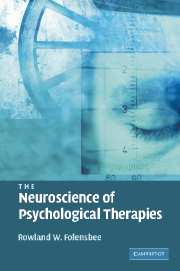Book contents
- Frontmatter
- Contents
- Acknowledgements
- 1 Introduction
- Part 1 Basic concepts
- 2 Neuropsychological concepts
- 3 Neural networks
- 4 Memory and learning
- 5 Affect
- 6 Anxiety
- 7 Processes of brain development
- 8 Themes of brain development
- 9 Basic concepts: summary and integration
- Part 2 The process of psychotherapy
- Appendix: Neuroimaging and psychological therapies
- References
- Index
5 - Affect
Published online by Cambridge University Press: 15 December 2009
- Frontmatter
- Contents
- Acknowledgements
- 1 Introduction
- Part 1 Basic concepts
- 2 Neuropsychological concepts
- 3 Neural networks
- 4 Memory and learning
- 5 Affect
- 6 Anxiety
- 7 Processes of brain development
- 8 Themes of brain development
- 9 Basic concepts: summary and integration
- Part 2 The process of psychotherapy
- Appendix: Neuroimaging and psychological therapies
- References
- Index
Summary
The previously presented description of the neural network concept briefly identified the special contributions of affect to neural network patterns and to memory processes. The connections between affect and memory should be clearly delineated.
The amygdala (see Figure 1.1) is a primary center for the processing of emotions (LeDoux, 2002; McGaugh, 2004). Multiple connections exist between the amygdala and the hippocampus, and there is strong evidence that the two areas of the brain work in tandem. LeDoux (1996) has suggested that hippocampal integrations would be affect-free without the connections between the amygdala and the hippocampus. However, the amygdala also has direct and indirect interconnections with sensory cortex and sensory receptor neurons, so ties between sensory information and emotion can be established both with and without conscious awareness and explicit memory systems (LeDoux, 1996).
It appears that the amygdala contributes to memory storage by activating memory consolidation processes in other parts of the brain when positive or negative emotion is present (McGaugh, 2004). Stimuli with positive or negative emotional valence are remembered more clearly than are neutral stimuli. For example, faces with either positive or negative expressions are remembered better than are faces with neutral expressions, and neural imaging of the brain indicates that increased amygdala activity accompanied by commensurate hippocampal activity parallels the differences in learning (Dolcos et al., 2003). Neutral stimuli are learned more effectively, as well, when followed by administration or stimulation of hormones or neurotransmitters associated with emotion and activation of the amygdala.
- Type
- Chapter
- Information
- The Neuroscience of Psychological Therapies , pp. 41 - 44Publisher: Cambridge University PressPrint publication year: 2007



